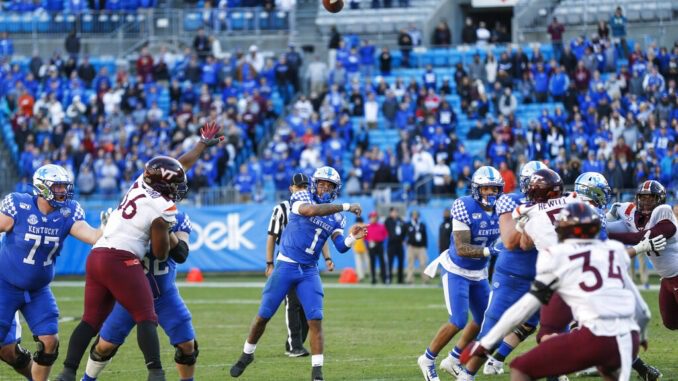
The collection of games will now be called “Bowl Season,” college football’s attempt to replicate the catchy slogans of March Madness and the Big Dance that end the basketball season.
“One of the things I heard consistently was that we needed to promote the bowl system and tell all the great stories about how meaningful bowl games are to everyone involved,” said Bowl Season’s executive director Nick Carparelli, who was hired 11 months ago to lead the organization. “We weren’t set up in a way to do that.”
Carparelli’s top priority on the job was to change that. The name change is a first step toward building excitement around the bowls, which have, in the past, seen small crowds and, at times, less than 100% effort from the teams involved.
“Nine months of work on the part of a lot of individuals, and Bowl Season was born,” Carparelli said. “I like to say it’s a new brand that’s been around for 100 years. It’s a platform to promote the entire bowl system and the individual games in a way we couldn’t in the past.”
Of course, the pandemic had an impact on the transition. It was tough to build excitement when it wasn’t clear that there would be a season, let alone bowl games at the end of it.
“Nothing has been easy for anyone this year,” Carparelli said. “It took more time for it to come together than any of us would have liked.”
Some bowl games did fall victim to the pandemic. Among the games originally planned for this year, six will not be played — the Redbox Bowl in the San Francisco Bay Area, the Hawaii Bowl, the Bahamas Bowl, the Holiday Bowl, Las Vegas Bowl and the Quick Lane Bowl. The inaugural Fenway Bowl has also been put off a year but will be replaced by the Montgomery Bowl.
“With so much affected by the pandemic, it was naive to think there wouldn’t be a few bowls impacted as well,” Carparelli said.
There will still be 34 games leading up to the College Football National Championship Game.
Bowl Season starts on Dec. 19 and, as it traditionally does, has games on an almost daily basis through the holidays.
That includes the annual game in Charlotte, formerly known as the Belk Bowl. Now known as the Duke’s Mayo Bowl, thanks to a change in sponsorship, the game will match teams from the ACC and Big Ten at Bank of America Stadium. It’s scheduled for Wednesday, Dec. 30 at noon and will be televised on ESPN.
The bowl experience will likely be different for the teams involved. Normally, teams have a week of events. In Charlotte, players traditionally get a day at the speedway as well as shopping sprees, dinners and other celebrations.
Due to COVID, expect a trimmed-down bowl experience for teams.
“I think we’ll be looking at a lot of two-day trips,” Carparelli said. “Teams will fly in the day before. They’ll stay in their hotels. Organizers will bring in local food to their hotel. They’ll bring in their bowl gifts. But I don’t think you’ll see both teams come together for pregame events.”
It’s also possible that, as we’ve seen in the regular season, outbreaks will force changes to the bowl schedule and cancellation of some games.
“We’re hopeful that these games all get played,” he said, “and we expect that the vast majority of them will, but one thing I learned this year is to expect the unexpected.”
One area where things will be a bit more stable is in the selection of teams. With schedules shortened in the regular season and games being canceled, the NCAA has waived the six-win rule for bowl eligibility. Essentially, conferences will get to decide which teams are bowl-worthy based on their own criteria. That means instead of going into the last week of the season with teams still fighting to become eligible, we’ll go back to the smoke-filled rooms of a generation ago when bowl deals were agreed upon and set with weeks to go in the season.
The big benefit of that will be that it will allow travel plans to be made in advance, both for teams and for any fans who are willing to brave the pandemic — and reduced capacities at stadiums — to make the trip. It’s just one example of the new Bowl Season group making the best of a bad situation to pursue its mission — building excitement around the bowls.
For instance, shortened schedules meant the cancellation of most of the nonconference games on teams’ schedules. That means the bowl game will be one of the few opportunities to see Power Five conference teams go head-to-head.
“The bowl season is a celebration of college football,” Carparelli said.



